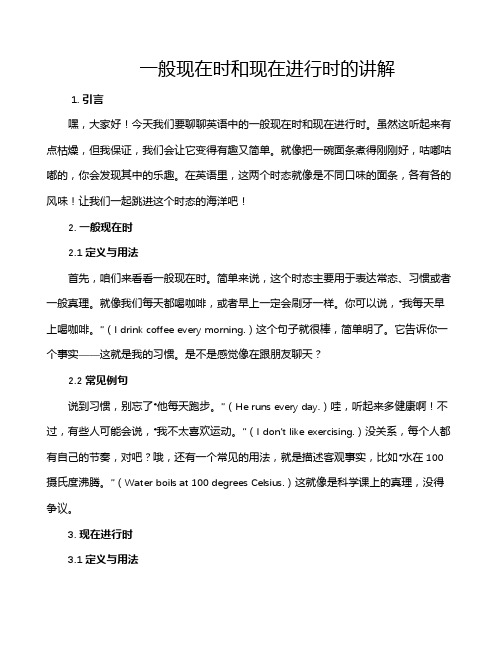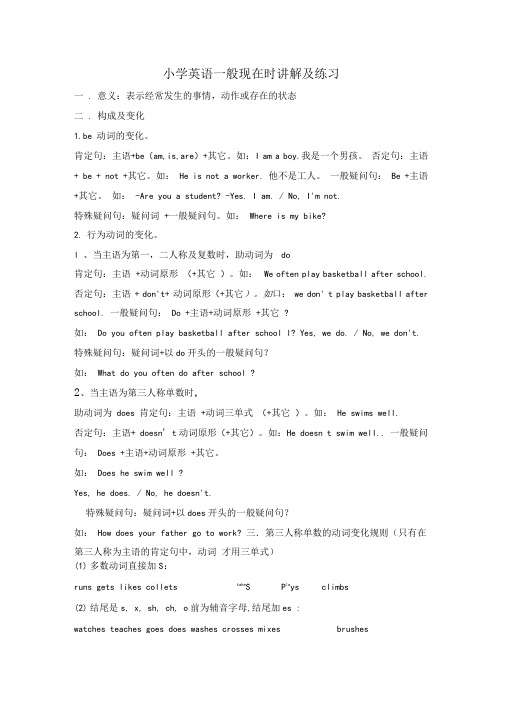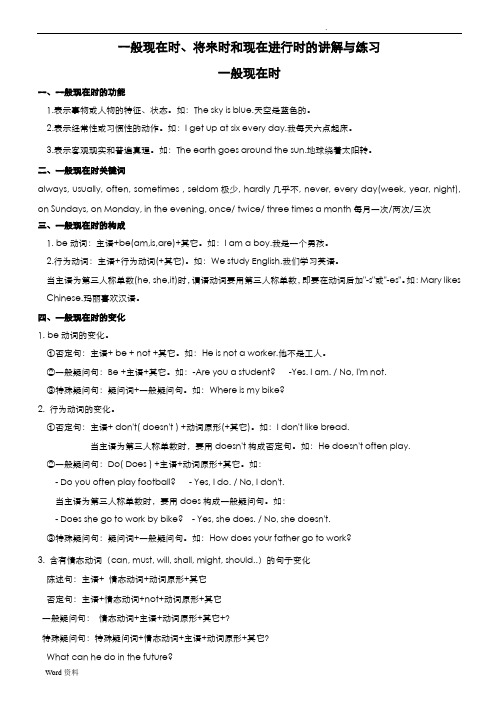一般现在时和现在进行时练习题说课讲解
(完整版)初中语法一般现在时和现在进行时讲解、练习含答案

一般现在时:一、定义与讲解:一般现在时表示经常或习惯性的动作或一般性事实。
,也可表示现在的状态或主语具备的性格和能力。
通常与副词every day(每天),always(总是),usually(通常),often (经常)sometimes(有时),等时间状语连用。
例:(1)表示事物或人物的特征、状态。
The sky is blue.天空是蓝色的。
Mary’s father is an English teacher. 玛丽的爸爸是一名英语老师。
(2)表示经常性或习惯性的动作。
I get up at six every day.我每天六点起床。
She plays sports every day. 她每天都做运动。
(3)表示客观现实。
The table has four legs.桌子有四条腿。
There are 50 students in my class. 我们班有50个学生。
(4)表示客观真理,科学原理,自然现象,等客观事实或格言谚语等。
The sun rises in the east every day.太阳每天从东方升起。
The earth goes around the sun.地球绕着太阳转。
(5)表示平日的喜好。
I like bananas. We don’t like vegetables.He likes ice cream. She doesn’t like strawberries.二.只有主语在第三人称单数时用动词的“三单形式”,其他人称用动词原形。
★动词三单形式的变化规则:1.(1)多数直接在动词词尾加-s.play — plays like — likesask---asks work---works get---gets call---calls(2)以字母s, x, ch, sh或o结尾的动词,在词尾直接加-es.watch---watches wish---wishes do---does go---goes (3)以“辅音字母加 - y”结尾的动词,要先变y为i再加-es.try---tries study---studies cry---cries fly---flies2.不规则变化:be---- is have----has三、一般现在时的句子转换:(1)变一般疑问句:当句子中有be动词或情态动词时,则把be动词或情态动词(can,could等)提到主语的前面,(口诀:一调二变三问号);(2)变否定句:在be动词或情态动词后面直接加not变成否定句. (be后not 莫忘记)例:①陈述句:She is my sister..疑问句→ Is she your sister? Yes, I am./ No, I’m not.否定句→ She is not my sister.②陈述句:I can play soccer.疑问句→ Can you play soccer? Yes,Ican./ No, I can’t.否定句→ I can not /can’t play soccer.★注意:对一般疑问句的回答:一般用什么问就用什么来回答。
一般现在时VS现在进行时复习课教案

一般现在时VS现在进行时复习课教案一、教学目标:1. 让学生理解和掌握一般现在时和现在进行时的用法。
2. 培养学生运用一般现在时和现在进行时进行交际的能力。
3. 提高学生对英语时态的认知和运用能力。
二、教学内容:1. 一般现在时的用法:表示经常性、习惯性的动作或状态。
2. 现在进行时的用法:表示正在进行的动作或当前的状态。
三、教学重点和难点:1. 一般现在时的构成:主语+动词原形。
2. 现在进行时的构成:主语+be动词+动词ing形式。
3. 区分一般现在时和现在进行时的用法和情境。
四、教学方法:1. 任务型教学法:通过完成各种任务,让学生在实际操作中学习和运用语言。
2. 情境教学法:创设各种情境,让学生在真实的语境中学习英语。
3. 互动式教学法:鼓励学生积极参与,提高课堂氛围。
五、教学步骤:1. 导入:引导学生回顾一般现在时和现在进行时的概念和用法。
2. 讲解:通过示例和练习,讲解一般现在时和现在进行时的构成和用法。
3. 实践:让学生分组进行角色扮演,运用一般现在时和现在进行时进行交际。
4. 任务:布置一道关于一般现在时和现在进行时的练习题,让学生在规定时间内完成。
5. 反馈:对学生的练习进行点评和指导,纠正发音和语法错误。
7. 作业:布置课后作业,让学生巩固所学内容。
8. 课后反思:教师对本节课的教学效果进行反思,为下一节课的教学做好准备。
六、教学评估:1. 课堂观察:观察学生在课堂活动中的参与程度、发音和语法正确性。
2. 练习完成情况:检查学生完成练习的情况,包括语法、拼写和书写规范。
3. 角色扮演表演:评价学生在角色扮演中的语言表达和交际能力。
七、教学资源:1. PPT课件:展示一般现在时和现在进行时的用法和示例。
2. 练习题:提供有关一般现在时和现在进行时的练习题。
3. 角色扮演卡片:准备不同场景的角色扮演卡片,供学生使用。
八、教学进度安排:1. 第1-2周:一般现在时和现在进行时的讲解与实践。
一般现在时、现在进行时讲解及练习MicrosoftWord文档

一般现在时、现在进行时讲解及练习MicrosoftWord文档一般现在时态一、一般现在时的定义一般现在时是表示现在经常反复发生的动作,存在的状态或习惯性的动作的时态。
二、一般现在时的结构一般现在时用行为动词的原形,但第三人称单数作主语时,动词的词尾要加-s 或- es。
现在以连系动词be 和行为动词read为例,对一般现在时的肯定句、否定句、疑问句及其简略答语的构成以表格形式加以说明:动词肯定句否定句be I am …I am not …You/We/They are …You/We/They are not …He/She/It is ... He/She/It is not …read I/We/You/They read…I/We/You/They/ do notread …He/She/It reads …He/She/It does not read …动词疑问句简略答语(肯定)简略答语(否定)be Am I …?Yes , you are. No, you are not. Are you …?Yes, I am/we are. No, I am/we are not. Are we …?Yes, we/you are. No, we/ you are not. Are they …?Yes, they are. No, they are not.Is he…?Yes, he is. No, he is not.Is she …?Yes, she is. No, she is not.Is it …?Yes, it is. No, it is not.read Do I / we / theyread …?Yes, you / we /they do.No, you / we / theydo not.Does he / she / itread … ?Yes, he / she / itdoes.No, he / she / it doesnot.连系动词be 的各种形式常与代词或not缩写成一个词。
【时态】小学一般现在时与现在进行时讲解及练习

现在进行时
练习2:用is / am / are 填空。
练习3:根据提示回答问题。
练习4:看图用现在进行时写句子。
一般现在时
(一)主语为I/you/we/they
练习2:按要求改写句子。
(二)主语为he/she/it
肯定句否定句一般疑问句Zoe/like/sports
Dave/live/in London
She/cry/in the bedroom
练习2:按要求写句子。
练习3:按要求改写句子。
(三)一般现在时总结
练习1:选择适当的助动词填空。
练习2:句型转换。
练习3:根据提示完成短文。
一般现在时与现在进行时
练习1:改为否定句。
练习2:改为一般疑问句。
练习3:选择适当的词填空。
练习4:选择适当的词。
练习5:用now或者every day 填空。
练习6:用am / is / are 或者do / does 填空。
练习7:根据提示回答问题。
练习8:根据用一般现在时或现在进行时提示写句子。
一般现在时现在进行时一般过去时讲解

一般过去时态(1)基本用法1.一般过去时通常用来表示过去发生的动作或存在的状况。
如:--- Where were you last week上周你在哪儿--- I was at my uncle's home in the countryside.(上周)我在乡下的叔叔家。
2.有些情况,发生时间没有明确标明,但实际上是过去发生的,应用过去时态;另外,在谈到已故去的人时,也多用过去时。
如:He bought a cat, and now they are good friends.他买了一只猫,现在他们是好朋友了。
Lu Xun was a great writer.鲁迅是一位伟大的作家。
(2)时间状语与一般过去时连用的时间状语有:yesterday(昨天), last night(昨晚), last week(上个星期), four days ago(四天前), in 2002(在2002年), just now(刚才), the day before yesterday(前天)等。
如:He went to the park yesterday.她昨天去了花园。
I was ten years old in 2001.我2001年才10岁。
(3)动词的过去式在一般过去时态中会涉及到动词的过去式,大家要掌握规则动词的过去式的变化规则。
其基本的变化规则如下:①一般情况下,在动词原形后直接ed。
如:play –played , look –looked。
②以e结尾的动词在其后加d。
如:like –liked, use –used。
③与辅音字母加y结尾的动词,把y变成i再加ed。
如:carry –carried, marry - married。
④以重读闭音节(或r音节)结尾,末尾只有一个辅音字母时,双写这个辅音字母,再加ed。
如:stop –stopped, prefer –preferred。
当然,刚才提到的都是规则动词的构成,我们还学过许多不规则动词的过去式形式。
一般现在时VS现在进行时复习课教案

一般现在时VS现在进行时复习课教案一、教学目标1. 让学生理解并掌握一般现在时和现在进行时的用法。
2. 培养学生运用一般现在时和现在进行时进行交际的能力。
3. 提高学生对英语时态的辨识能力。
二、教学内容1. 一般现在时的用法:表示经常性、习惯性的动作或状态。
2. 现在进行时的用法:表示正在进行的动作或当前的状态。
3. 区分一般现在时和现在进行时的情景和语境。
三、教学重难点1. 掌握一般现在时和现在进行时的结构。
2. 区分一般现在时和现在进行时的用法和情景。
四、教学方法1. 任务型教学法:通过任务驱动,让学生在实践中学习和运用语言。
2. 情境教学法:创设真实的情景,让学生在特定的语境中学习英语。
3. 互动式教学法:引导学生积极参与课堂活动,提高课堂参与度。
五、教学过程1. 导入:通过图片或故事引导学生回顾一般现在时和现在进行时的用法。
2. 新课讲解:讲解一般现在时和现在进行时的结构、用法和情景。
3. 实例分析:提供一些实例,让学生区分一般现在时和现在进行时。
4. 小组讨论:让学生分组讨论一般现在时和现在进行时的用法,分享自己的观点。
5. 任务练习:设计一些任务,让学生在完成任务的过程中运用一般现在时和现在进行时。
6. 课堂反馈:教师对学生的回答进行点评,指出错误并给予改正。
7. 课后作业:布置一些练习题,让学生巩固所学内容。
六、教学评价1. 评价方式:采用形成性评价和终结性评价相结合的方式,全面评估学生的学习效果。
2. 评价内容:a. 学生对一般现在时和现在进行时的理解程度。
b. 学生运用一般现在时和现在进行时的准确性。
c. 学生在实际情景中运用一般现在时和现在进行时的流畅性。
七、教学资源1. 教学课件:制作课件,展示一般现在时和现在进行时的用法和实例。
2. 练习题库:准备一些练习题,用于课堂练习和课后作业。
3. 情景卡片:制作一些卡片,上面写有一般现在时和现在进行时的句子,用于情景模拟。
八、教学进度安排1. 课时:两课时(90分钟)2. 教学计划:第一课时:讲解一般现在时和现在进行时的用法,实例分析,小组讨论。
一般现在时和现在进行时的讲解

一般现在时和现在进行时的讲解1. 引言嘿,大家好!今天我们要聊聊英语中的一般现在时和现在进行时。
虽然这听起来有点枯燥,但我保证,我们会让它变得有趣又简单。
就像把一碗面条煮得刚刚好,咕嘟咕嘟的,你会发现其中的乐趣。
在英语里,这两个时态就像是不同口味的面条,各有各的风味!让我们一起跳进这个时态的海洋吧!2. 一般现在时2.1 定义与用法首先,咱们来看看一般现在时。
简单来说,这个时态主要用于表达常态、习惯或者一般真理。
就像我们每天都喝咖啡,或者早上一定会刷牙一样。
你可以说,“我每天早上喝咖啡。
”(I drink coffee every morning.)这个句子就很棒,简单明了。
它告诉你一个事实——这就是我的习惯。
是不是感觉像在跟朋友聊天?2.2 常见例句说到习惯,别忘了“他每天跑步。
”(He runs every day.)哇,听起来多健康啊!不过,有些人可能会说,“我不太喜欢运动。
”(I don’t like exercising.)没关系,每个人都有自己的节奏,对吧?哦,还有一个常见的用法,就是描述客观事实,比如“水在100摄氏度沸腾。
”(Water boils at 100 degrees Celsius.)这就像是科学课上的真理,没得争议。
3. 现在进行时3.1 定义与用法接下来,让我们转到现在进行时。
这个时态主要用于描述正在进行的动作,就像现在正在煮的面条,嘶嘶作响的!例如,“我正在看电视。
”(I am watching TV.)这个句子让人感觉很生动,就像你能看到我在沙发上懒洋洋的样子。
现在进行时让我们的对话充满了动态感,仿佛时间在此刻停止。
3.2 常见例句想象一下,一个阳光明媚的下午,你和朋友在一起。
你可以说,“我们正在聊关于旅行的事情。
”(We are talking about travel.)这时的你们似乎置身于一个快乐的泡泡中,讨论着未来的冒险。
又或者,“他正在做作业。
”(He is doing homework.)这就像一部悬疑剧,究竟他能不能按时完成呢?总之,正在发生的事情让我们感到兴奋和紧张。
一般现在时和现在进行时时态练习及讲解

小学英语一般现在时讲解及练习一. 意义:表示经常发生的事情,动作或存在的状态二. 构成及变化1.be 动词的变化。
肯定句:主语+be(am,is,are)+其它。
如:I am a boy.我是一个男孩。
否定句:主语+ be + not +其它。
如:He is not a worker. 他不是工人。
一般疑问句:Be +主语+其它。
如:-Are you a student? -Yes. I am. / No, I'm not.特殊疑问句:疑问词+一般疑问句。
如:Where is my bike?2.行为动词的变化。
l 、当主语为第一,二人称及复数时,助动词为do肯定句:主语+动词原形(+其它)。
如:We often play basketball after school. 否定句:主语+ don't+ 动词原形(+其它)。
如口:we don' t play basketball after school. 一般疑问句:Do +主语+动词原形+其它?如:Do you often play basketball after school l? Yes, we do. / No, we don't. 特殊疑问句:疑问词+以do开头的一般疑问句?如:What do you often do after school ?2、当主语为第三人称单数时,助动词为does 肯定句:主语+动词三单式(+其它)。
如:He swims well.否定句:主语+ doesn' t动词原形(+其它)。
如:He doesn t swim well.. 一般疑问句:Does +主语+动词原形+其它。
如:Does he swim well ?Yes, he does. / No, he doesn't.特殊疑问句:疑问词+以does开头的一般疑问句?如:How does your father go to work? 三.第三人称单数的动词变化规则(只有在第三人称为主语的肯定句中,动词才用三单式)(1)多数动词直接加S:runs gets likes collets take S P la ys climbs(2)结尾是s, x, sh, ch, o前为辅音字母,结尾加es :brusheswatches teaches goes does washes crosses mixes(3)动词末尾y前为辅音:将y改为i加es: study —studies fly —flies carry —carries cry —cries但在y前如果为元音则直接加s: buys says四.时间标志:always , usually , ofte n , sometimes ,every一般现在时练习题(1)I.用下列单词的适当形式填空1.We often __________ (play) in the playgro und.2.He _________ (get) up at six o ' clock.3. _________ you ___________ (brush) your teeth every morning?4.What _________________ (do) he usually _________________ (do) after school?5.Da nny _________________ (study) En glish, Chin ese, maths, scie nee and Art atschool.6.Mike sometimes __________ (go) to the park with his sister.7.At eight at ni ght, she ______ (watch) TV with his pare nts.8. _______ Mike _________ (read) En glish every day?9.How many lessons __________ your classmates _________ (have) on Mon day?10.What time ________ his mother __________ (do) the housework?11.句型转换1.Do you often play football after school?(改为肯定句)2.1have many books.(改为否定句)3.Gao Shan ' s sister likes playingpble tennis (改为否定句)4.She lives in a small tow n near New York.(改为一般疑问句)5.1watch TV every day.(改为一般疑问句)6.We have four lessons.(改为否定句)7.Nancy doesn ' t run fast(改为肯定句)8.My dog runs fast.(改为否定句)9.Mike has two letters for him.一般疑问句:_________________________________________________ 否定句:___________________________________________________ 10.1usually play football on Friday after noon.否定句: ____________________________________________________ 一般疑问句:_______________________________________________ 划线提问:___________________________________________________ 11.Su Yang usually washes some clothes on Saturday.否定句: ____________________________________________________ 一般疑问句:_______________________________________________ 划线提问:_________________________________________________ 12.Mingming usually waters the flowers every day.否定句: ____________________________________________________ 一般疑问句:_______________________________________________ 13.Tom does his homework at home.否定句: ____________________________________________________ 一般疑问句:_______________________________________________ 一般现在时练习题(2)一、用所给动词的真确形式填空1.I like ____________ (swim).2. ___________ He (read) English every day.3. ___________ We (go)to school at seven in the morning.4. ___________ Mike (go)to school at seven in the morning.5. ________________ My mother ___ (like) (go) shopping.6.I can ________ (draw) many beautiful pictures.7.She __________ (make) a model plane.8.Do you _________ (like) ________ (run)?9.Does he ___________ (like) ______ (jump) ?10. __________________ Does Nancy (grow)flowers on Saturday ?11. __________________ The teachers _____ (like) (dance).12. __________________ The teacher ______ (like) (dance).13. _____________________ The students (speak) English in class.14. __________________ The student (speak) Chinese after class.15.Let ' s _____________ a nd play football . (go)16.He ______________ like swimming . (not)17.I ' m sorry _____________ that . (hear)18.Wang Bing is _____________ (write) an E-mail to his friend .19.He has ______________ a headache . (get)20. _______ you study English at school ? Yes , I _________ . (do)21. _________ your sister study English at school ? No , she _______ . (do)22.I ' m __________ better . (feel)23.Why ___________ Tom absent today ? (be)二、用所给的人称改写句子1.I take photos on Sunday. (Mike)2.We grow beautiful flowers. (she)3.They like collecting stamps. (Ben)4.I listen to music carefully. (my aunt)5.You like making a model ship. (Helen)6.We clean the classroom every day. (he)7.They look after the pandas. (Mr Wang)8.I draw a tree and some flowers. (Nancy) 9.We go to bed at eight. (my sister)10.I read newspapers in the evening. (Mr Green)小学现在进行时讲解及练习题1、概念:现在进行时表示说话时正在发生的事情或状态。
一般现在时-将来时和现在进行时的讲解与练习

一般现在时、将来时和现在进行时的讲解与练习一般现在时一、一般现在时的功能1.表示事物或人物的特征、状态。
如:The sky is blue.天空是蓝色的。
2.表示经常性或习惯性的动作。
如:I get up at six every day.我每天六点起床。
3.表示客观现实和普遍真理。
如:The earth goes around the sun.地球绕着太阳转。
二、一般现在时关键词always, usually, often, sometimes , seldom极少, hardly几乎不, never, every day(week, year, night), on Sundays, on Monday, in the evening, once/ twice/ three times a month每月一次/两次/三次三、一般现在时的构成1. be动词:主语+be(am,is,are)+其它。
如:I am a boy.我是一个男孩。
2.行为动词:主语+行为动词(+其它)。
如:We study English.我们学习英语。
当主语为第三人称单数(he, she,it)时,谓语动词要用第三人称单数,即要在动词后加"-s"或"-es"。
如:Mary likes Chinese.玛丽喜欢汉语。
四、一般现在时的变化1. be动词的变化。
①否定句:主语+ be + not +其它。
如:He is not a worker.他不是工人。
②一般疑问句:Be +主语+其它。
如:-Are you a student? -Yes. I am. / No, I'm not.③特殊疑问句:疑问词+一般疑问句。
如:Where is my bike?2. 行为动词的变化。
①否定句:主语+ don't( doesn't ) +动词原形(+其它)。
如:I don't like bread.当主语为第三人称单数时,要用doesn't构成否定句。
现在进行时习题附一般现在时教学内容

现在进⾏时习题附⼀般现在时教学内容现在进⾏时1.现在进⾏时表⽰现在正在进⾏或发⽣的动作,也可表⽰当前⼀段时间内的活动或现阶段正在进⾏的动作。
2.现在进⾏时的肯定句基本结构为be+动词ing.3.现在进⾏时的否定句在be后加not。
4.现在进⾏时的⼀般疑问句把be动词调到句⾸。
5.现在进⾏时的特殊疑问的基本结构为:疑问词+ be + 主语 + 动词ing? 如:What are you doing? 你正在做什么?但疑问词当主语时其结构为:疑问词 + be + 动词ing? 如: Who is singing over there? 谁正在那⼉唱歌?6 动词加ing的变化规则(1)⼀般情况下,直接加ing,如:cook-cooking(2)以不发⾳的e结尾,去e加ing,如:make-making, taste-tasting(3)如果末尾是⼀个元⾳字母和⼀个辅⾳字母,双写末尾的辅⾳字母,再加ing,如:run-running, stop-stopping sit-sitting get-getting run-running forget-forgetting begin-beginning(4)以ie结尾的动词,改ie为y加ing ,如:die--dying lie--lying现在进⾏时专项练习:⼀、写出下列动词的现在分词:play____run_____swim____make_____go_____like_____write____ski_____re ad____have_____sing____dance_____put____see____buy_____love______live____take____come__ __get_____stop_____ sit ____ begin_____ shop_____⼆、⽤所给的动词的正确形式填空:1.The boy ________ ( draw)a picture now.2. Listen .Some girls ________ ( sing)in the classroom .3. My mother __________ ( cook )some nice food now.4. What _____ you ______ ( do ) now?5. Look . They _________( have) an English lesson .6.They________(not ,water) the flowers now.7.Look! the girls ________________(dance )in the classroom .8.What is our granddaughter doing? She ________(listen ) to music.9. It’s 5 o’clock now. We _____________(have)supper now10.______Helen____________(wash )clothes? Yes ,she is .三、句型转换:1. They are doing housework .⼀般疑问句:__________________ 否定句: _________________2.The students are cleaning the classroom .⼀般疑问句:__________________ 否定句: _________________3.I’m playing the football in the playground .(对划线部分进⾏提问)_____________4.Tom is reading books in his study . (对划线部分进⾏提问)________________四、现在进⾏时:表⽰现在进⾏的动作句⼦结构:be+动词ing时间状语:now, look, listen,It’s …o’clck,1. What are you _________(do) now? I _________(eat) bread.2. It’s nine o’clock. My father_________(work) in the office.3. Look, the boy____________(put) the rubbish into the bin.4. ________he______(clean) the classroom? No, he isn’t.He__________(play) now.5.Where is Mak? He_________(run) on the grass.6. Listen, who_________(sing) in the music room? Oh, Mary_______(sing) there.五、将下列句⼦改成现在进⾏时1. Tom can speak Chinese. ________2. We have four lessons. ________3. I watch TV every day. _____________4. She works in a hospital. ________5. Kitty and Ben have lunch at about twelve. _________________6. His father can help them. ___________7. Danny, open thedoor._________8.They watch TV in the evening. _________________________六.按要求改写句⼦1. The boy is playing basketball.否定句:_________________⼀般疑问句:_____________肯定回答:______否定回答:__________对“is playing basketball”提问:_____________ 对“ The boy”提问:_______________2. They are singing in the classroom.否定句:_______________⼀般疑问句:___________肯定回答:________否定回答:__________对“are singing ”提问:___________ 对“ in the classroom”提问:_____________七.⽤现在进⾏时完成下列句⼦:1.What________you_________(do)?2.I___________(sing) an English song.3.What________he____________(mend)?4.He____________(mend) a car.5.______you__________(fly) a kite?Yes,_______.6.______she___________(sit) in the boat?7.______you_____________(ask) questions? 8.We_______________(play) games now ⼋. 选择填空。
小学英语时态语法:现在进行时、一般现在时时态讲解PPT课件

monkey ______ ______ up and down.
Homework: Finish the exercise6.
谢谢大家!
home. 4. What time __do_e_s__ the shop _c_lo_se___ (close)? It _c_lo_se_s_ (close)
at nine o'clock in the evening.
5.Miss Guo __tea_c_he_s_ (teach) us Chinese this term. She ___is___ (be) a very good teacher. She often __ta_lk_s __ (talk) with us after class. Many of us like __ta_lk_in_g _ (talk) with her. Now, she _i_s _ta_lki_ng_ (talk) with Lily.
小学英语时态语法:现在进行时、 一般现在时时态讲解PPT课件
一、现在进行时的定义:表示现在正在进行或发生的动
作 。(句中一般含有now, 单独的look或 listen出现
在句首.)
二、它的结构:be + 动词ing 形式
三、动词加ing的变化规则 1.一般情况下,直接加ing,如:cook-cooking 2.以不发音的e结尾,去e加ing,如:make-making,
改句子 1. Do you often play football after school? (肯定回答)
Yes, we do.
2. I have some books. (改为否定句) I _d_o_n_’t _h_a_v_e_ _a_n_y___ books.
现在进行时讲解+练习

概述:一般现在时(The Present Indefinite )表示现在成为习惯或经常性的动作;现在进行时(The Present Continuous)则表示现在正在进行的动作。
1.1现在进行时的构成 肯定句:主语 + am/is/are +现在分词...否定句:主语 + am/is/are + not +现在分词 …疑问句:Am/Is/Are + 主语+现在分词...?疑问代词/疑问副词 + am/is/are + 主语+现在分词…? 1.2现在进行时的肯定句 句型:主语+ am/is/are + 现在分词 …He is brushi ng his teeth. 他正在刷牙。
Mother is wait ing for me. 母亲在等我。
1.3现在进行时的否定句句型:主语 + am/is/are + not + 现在分词 …rm n ot doi ng anything right now.我现在没做什么事情。
She is not dancing , but doing exercise. 她不是在跳舞,而是在锻炼。
1.4现在进行时的疑问句一般疑问句句型: Am/Is/Are + 主语+ 现在分词...? 回答方式:Yes ,主语+ am/is/are. No ,主语 + am/is/are + not. 现在进行时的疑问句是将助动词 am/is/are 置于主语之前(大写 am/is/are的第一个字母),在句尾加问号;这种语序是倒装语序:Are you leavi ng already? 你这么早就要走了吗 ?Is it raining now? —Yes , it is./No , it isn't.现在下雨吗? -------------- 是的,在下雨。
/ 不,不下了。
Are they helping the old lady? — Yes , they are./No ,they aren't.他们在帮助这位老妇人吗? ---- 是的。
一般现在时与现在进行时讲解及练习

1.be 动词的一般现在时的句式: 肯定句:主语+be+表语(n., adj.等)
e.g. He is a worker. You are thirteen. They are in the classroom. e.g. He is not a worker. You aren’t thirteen. They aren’t in the classroom.
B 5.He often _________ supper at 6:00 in the evening.
A. have B. has C. is having D. has got C 6. We _____________ any Chinese classes on Friday.
A. don’t has C. don’t have B. doesn’t have D. are have
B 1.I want____homework now. (A)doing (C)to do my (B)to do (D)do my
C 2.It's time______.
(A)go to school (C)to go home homeworks (B)play games (D)to do my
e.g. What is he? What color is that bird? How old are you? Where are they ?
特殊疑问句:疑问词+be+主语?
2.实义动词的一般现在时句式:
肯定句:主语(I/We/You/They)+实义动词+其他 e.g. I stay at home on Saturdays. They have sports every day. 主语(He/She/It)+实义动词三单现形式+其他 e.g. He stays at home on Saturdays. Lucy has sports every day. 否定句:主语(I/We/You/They)+do+ not+动词原形+其他 e.g. I don’t stay at home on Saturdays. They don’t have sports every day. 主语(He/She/It)+does +not+动词原形+其他 e.g. He doesn’t stay at home on Saturdays. Lucy doesn’t have sports every day. 一般疑问句:Do+主语(I/we/you/they)+动词原形+其他? e.g. Do you stay at home on Saturdays? Do they have sports every day? Does+主语(he/she/it)+动词原形+其他? e.g. Does he stay at home on Saturdays? Does Lucy have sports every day?
一般现在时和现在进行时详细讲解

(1)行为动词What do they do every day?How often does Peter go fishing?(2) 系动词(be):Who is the girl at that gate?考点一:一般现在时可表习惯性,经常性的动作,常与often,always,sometimes,once a week, everyday,on weekends等连用。
如:I get up at six every morning.我每天早晨六点钟起床。
She often goes to school by bus.她经常乘公共汽车上学(2010广西梧州)My sister is a nurse.She _______early every morning.A.get upB.is getting upC.got upD.gets up【2011上海】Now my father _____ his bike to work every day instead of driving.A. rideB. rodeC. RidesD. will ride【2011山东】.Although Bill isn’t rich enough, he often ______ money to the poor.A. will giveB. was givingC. givesD. gave【2011湖北·武汉】John likes playing soccer very much and he _____ about onehour playing it every day.A. spentB. will spendC. has spentD. spends【2011四川绵阳】This girl is ready to help people any time. When she is on the bus, she always her seat to someone in need.A. givesB. giveC. gaveD. giving考点二:一般现在时可表示人或物现在的状态或性质。
初中一般现在时和现在进行时讲解及练习题

初中一般现在时和现在进行时讲解及练习题现在进行时(一)现在进行时的构成肯定句:主语+be(am ,is, are)+Ving(现在分词)+其他成分主语 be Ving(现在分词)单数 I 第一人称复数 We单数 You 第二人称复数 YouHeShe单数第三人It 称其他单数Sam复数 they注:现在分词的构成变化方法动词原形 Ving(现在分词) 直接加ing play 以不发音的字母e结尾的单词,去掉字母e,再加ing take 结尾呈现“辅,元,辅”结构的动词,先双写末尾的stop 辅音字母,再加ing以ie结尾的动词,把ie改为y ,再加ing lie 否定句: + + + +I ________ __________ a student.(我不是学生。
一般疑问句: + + + , _________ _________ a student? 肯定回答:Yes, 主语+ be(am ,is, are) 否定回答:No,主语+ be(am ,is, are)+not. 特殊疑问句: 特殊疑问词+ be(am ,is, are)+主语+Ving(现在分词)+其他成分,(二)不用于现在进行时的动词:1)表示事实状态的动词,如have, belong, possess, cost, owe, exist, include, contain, matter, weigh, measure,continue等。
I have two brothers. 我有两兄弟。
This house belongs to my sister. 这房子是我姐的。
2)表示心理状态的动词,如know, realize, think see, believe, suppose, imagine, agree, recognize, remember, want,need, forget, prefer, mean, understand, love, hate等。
新概念英语时态讲解及练习题(五种时态)说课材料

新概念英语时态讲解及练习题(五种时态)五种时态讲解及练习题英语的时态(tense)是一种动词形式,不同的时态用以表示不同的时间与方式。
下面就英语中常见的八种基本时态进行阐述,其它的时态都是在这八种时态的基础上结合而成的。
一、一般现在时:1.概念:经常、反复发生的动作或行为及现在的某种状况。
2.时间状语:always, usually, often, sometimes, every week (day, year, month...), on ce a week, on Sundays,3.基本结构:动词原形(如主语为第三人称单数,动词上要加(e)S)4.否定形式:am/is/are+not;此时态的谓语动词若为行为动词,则在其前加don't,如主语为第三人称单数,则用doesn't,通常还原行为动词。
5.一般疑问句:把be动词放于句首;用助动词do提问,如主语为第三人称单数,则用does,同时,还原行为动词。
6.例句:It seldom snows here.He is always ready to help others.Action speaks louder than words.1.I like ____________ (swim).2.He _________(read) English every day.3.We _________(go)to school at seven in the morning.4.Mike________(go)to school at seven in the morning.5.My mother________(like) ______(go) shopping.6.I can ________(draw) many beautiful pictures.7.She_________(make) a model plane.8.Do you ________(like)_________(run)?9.Does he_________(like)_________(jump) ?10.Does Nancy_________(grow)flowers on Saturday ?11.The teachers________(like)___________(dance).12.The teacher________(like)____________(dance).2)用所给的人称改写句子1.I take photos on Sunday. ( Mike)2.We grow beautiful flowers. (she)3.They like collecting stamps. (Ben)4.I listen to music carefully. (my aunt)5.You like making a model ship. (Helen二、一般过去时:1.概念:过去某个时间里发生的动作或状态;过去习惯性、经常性的动作、行为。
一般现在时和现在进行时表将来的讲解

一般如今时和如今进行时表未来的讲授【1 】(一)如今进行时暗示未来如今进行时暗示未来,重要用于暗示按筹划或安插要产生的动作.常有“意图”“安插”或“打算”的寄义.这种如今进行时比较活泼,给人一种等待感. 它常表比来或较近的未来,所用动词多是转移动词. 表未来的如今进行时除用于转移动词外,亦可用于某些非转移动词.能如许用的动词经常应用的有:arrive, come, do, get, go, have, leave, meet, play, return, see, spend, start, stay, wear, work 等.如:I’m leaving tomorrow. 我明天走.They’re getting married next month. 他们下个月娶亲.Are you meeting Bill this evening? 你今晚将和比尔会晤吗?1) come, go, stay, arrive, leave 等词的如今进行时经经常应用来暗示未来确实的筹划.2) 暗示交通方法.行程安插的动词,例如fly,walk, ride, drive, take(a bus, a taxi)等的如今进行时也经经常应用于暗示未来.但偶然也暗示较远的未来.如:When I grow up, I’m joining the army. 我长大了要从军.3)表未来的如今进行时有时含有“决心”的意思,多用在否认构造中.如:I’m not going. 我不走了.I’m not waiting any longer. 我不再等了.有时也用在肯定构造中.如:I’m backing out. 我要打退堂鼓了.4)用这种如今进行时与对方讲话时可变成敕令,不过语气比较平和.如:You are staying. 你留下吧.Don’t forget: you are taking part too. 不要忘却:你也要介入.5)如今进行时也可在时光.前提或原因状语从句中暗示未来.如:when you are passing my way, please drop in. 你什么时刻路过我们家,请进来坐.(用于时光状语从句)If they are not doing it, what am I to do? 假如他们不干,那我该怎么办?(用于前提状语从句)She is going to the dentist tomorrow because she is having a tooth filled.6)暗示未来的如今进行时也可用在间接引语中,暗示措辞人信任它将是事实.如:He said he is going tomorrow. 他说他明天走.表未来的如今进行时有时从属于未来时态.如:On election night we’ll be telling you what’s happening in various places in this country. 到了选举的夜晚,我们将把全国各地的情况告知大家.when I have time, I’ll come down to the school to see how you’re both doing. 我有空时,会来黉舍看你们俩的进修情况.(when 引诱的前提状语从句,主将从现)(二)一般如今时表未来1.“主将从现”原则当主句为未来时态或暗示未来意义时,时光和前提的状语从句必须用一般如今时表未来:I’ll write to h er when I have time. 我有空会给她写信.Turn off the lights before you leave. 走前关灯.If we hurry, we may catch the bus. 假如抓紧走我们可能赶得上公共汽车.Tell me in case you get into difficulty. 碰到艰苦请告知我.【注】①除暗示时光和前提的状语从句外,暗示妥协.类似.比例的从句也必须用一般如今时表未来:I’ll follow him wherever he goes. 他去哪儿,我就跟着去哪儿.Whatever you say, I won’t pay. 无论你说什么,我都不会付钱.Whether we help him or not, he will fail. 无论我们帮他与否,他都邑掉败.I’ll have a good time whether I win or lose. 赢也好,输也好,我都将会玩好.The more you eat, the fatter you will become. 你吃得越多就会越胖.②别的,当主句为用未来时态时,定语从句也通经常应用一般如今时表未来:I’ll give you anything(that)you ask for. 你要什么我都给你.You can have anything I find. 我找到的任何器械你都可以拿去.Everyone who comes first will get a present. 每个先来的人都可得到一份礼品.2.简化原则按照英语习惯,一个句子中若重要动词已经标清晰明了所谈论动作的时光,那么与之相干的其他动词就不必再次指明统一时光,而往往应用一个比较简略的时态,如用一般如今时暗示一般未来时等.比较:This discovery means that we will spend less on food.这一发明意味着我们将削减在食物上的消费.3.几种值得留意的情况在make sure(弄清晰),make certain(弄清晰),take care(留意,当心),be careful(留意,当心),mind(留意),watch(留意)等后的that 从句中平日也只用一般如今时表未来意义: Take care that it does not occur again. 留意别再产生如许的事.We must take care that no one sees us. 我们必须留意别让人看见我们.Make sure you come back soon. 你要包管快点回来.Be careful that you don’t hurt her feelings. 当心别伤了她的情感.Watch that the baby doesn’t go near the heater. 留意别让宝宝接近加热器.Mind(that) you read the examination questions carefully before you begin to answer them.在答题前要留意细心浏览考题.【注】在it doesn’t matter, I don’t care, I don’t mind等构造(以及类似构造)后的名词性从句也通经常应用一般如今时表未来意义:It doesn’t matter where we go on holiday. 我们去哪儿度假都行.Does it matter who goes first? 谁先去这有关系吗?I don’t care whether we win or lose. 我不在乎我们是赢照样输.Don’t you care what happens to them? 岂非你不关怀他们出什么事了?4.可用两种时态的情况在I hope , I bet, see (to it)等后的宾语从句中通经常应用一般如今时暗示未来意义,但有时也可直接用未来时态:I hope that you like [will like] it. 你愿望你会爱好它.I bet it rains [will rain] tomorrow. 我打赌明天会下雨.See (to it) that children don’t catch cold. 当心别让孩子伤风.I’ll see that nobody disturbs [will disturb] you. 我将确保没人打搅你.【注】see (to it) 后的that从句通经常应用一般如今时表未来,直接用未来的情况较少见.5、用于比较状语从句在as, than 引出的比较状语从句中可用一般如今时暗示未来,也可直接用未来时态:We’ll get there as soon as you do [will]. 你一到,我们就到.We’ll probably drive faster than you do [will]. 我们开车很可能比你快.6.暗示筹划或安插暗示按划定.时光表.筹划或安插要产生的动作:Are you on duty next weekend? 下周末你上班吗?The train leaves at 12:00. 火车12点开出.Where do we go now? 我们如今到哪里去? Her birthday is this time by next year..【注】用于此用法时,句中平日有具体的时光状语.7.by the time…当主句为未来时态时,与之相干的by the time后接的从句要用一般如今时暗示未来意义:By the time he comes, I will have left. 等他到时,我会已分开了.The film will have started by the time we get tothe cinema.我们到片子院时片子会已经开端了.8.暗示如今将要宣告某事I declare the meeting open. 我宣告会议开端.We learn Lesson Ten today. 今天我们进修第10课.9.暗示客不雅性很强的未来Today is Friday, so tomorrow is Saturday. 今天是礼拜五,所以明天是礼拜六.My birthday is on a Sunday this year. 我本年的诞辰在礼拜天.【注】有时措辞者对某一未来事实异常肯定,也用一般如今时:The future is bright. 前程是光亮的.Final victory is ours. 最后的成功是我们的.三一般如今时与如今进行时暗示未来时的差别例析1.配合点两者均可与时光状语连用暗示已肯定的未来安插.如:I leave [am leaving] the day after tomorrow.我预定后天走.The children start [are starting] school on Monday.孩子们礼拜一就要开学了.2.不合点1)从小我颜色来看原则上说,一般如今时比如今进行时具有的小我颜色更少.比较:I’m leaving tonight.(可能指的是我决议要分开)I leave tonight.(可能指的是这是筹划的一部分,但筹划不一定是我订的)2)从是否正式来看在平日情况下,一般如今时要比如今进行时听起来更为正式,比方筹划创办一个新分店的百货市肆很可能说:Our new branch opens next week. 本店新设分店下周开业.但不说:Our new branch is opening next week.3)从是否简练来看有时,如今进行时显得包袱的地方就用一般如今时,例如在谈到像路程安插那样的一系列预定的未来的动作时,可以如许说:We leave at six, arrive in Dublin at ten and take the plane on...我们6点动身,10点到达都柏林,并在……乘飞机……而不说:We are leaving at six, arriving in Dublin at ten and taking the plane on...4)在动词hope, take care that, make sure that等的宾语从句中.例如: I hope they have a nice time next week. 我愿望他们下礼拜玩得高兴. Make sure that the windows are closed before you leave the room. 分开房间前,务必把窗户关了.五习题演习Ⅰ.用动词的恰当情势填空 (15)1. Look, the bus is_______________! (come)2. We __________to Roman next week. (go)3. Mr.Black _________Shanghai in a few days. (leave)4. __________ you __________anything special tonight? (do)5. We _______ _________ him after the performance. ( meet )6. When__________Mr.Manning __________ his holiday? ( take )7. Are you ______________ home in the evening? ( stay )8. When_______ you __________ for London? (leave)9. They are____________ at home for this weekend. (relax)10. Do you like going ___________ (ride)?11. Look, he __________(sit) his brother.12. Beijing is a good place _________(go) sightseeing.13. She plans ________ (study) English.(Plan to do something )14. Look out! The train ______________ (leave).15. Keep quiet, I ___________ (read) a newspaper.II.句型转换 (10)1. We are going to the beach for weekend.(一般疑问句)________ ________ _______ to the beach for weekend?2. The Greens are going bike riding for holiday.(对划线部分提问)________ ________ the Greens_________ for holiday?3. They are going to Italy next week.(对划线部分提问)__________ _________ they __________ next week?4. It’s about 4 li away from my home to school. (对划线部分提问)___________________________________________.5. he, friends, now, his, with, play, football. (连词成句,并用准确时态)_____________________________________________.1.I _______ for Hong Kong on Saturday. Will you see me off at the airport? √. am leaving B. am left C. am going to leave D. left2.I _______ to see grandma and help her with some housework every week.A.came √.am going to come e D.will come3.--What are Mr and Mrs Black doing?---They _______ tea in the garden.√4.My mother often asks me ______ early.A.get upB.got upC.getting up √.to get up5.We _______ to the park if it is fine tomorrow.√6.Look! One of the girls _______ the door.A.cleansB.is cleaningC.clean √.are cleaning7.If you don't feel well, you may just _________.A.stopped reading √.stop reading C.stopped to read D.stop to read8.There is going to _________a game in our school this afternoon.A.hasB.have √.be9.Stop! A little boy _______ the street.√.is crossing B.crosses C.crossed D.has crossed10.My mother is ill. I ______ stay at home and look after her.A.has to √.must (主不雅上必须) C.would D.have to (客不雅上必须)11.--- Where's Mabel?---She _____ pingpong behind the teaching building.A.was playing √。
- 1、下载文档前请自行甄别文档内容的完整性,平台不提供额外的编辑、内容补充、找答案等附加服务。
- 2、"仅部分预览"的文档,不可在线预览部分如存在完整性等问题,可反馈申请退款(可完整预览的文档不适用该条件!)。
- 3、如文档侵犯您的权益,请联系客服反馈,我们会尽快为您处理(人工客服工作时间:9:00-18:30)。
一般现在时和现在进行时练习题一.写出下列动词的第三人称形式和ing形式。
1.dance________ ________ 2. stop ________ ________3. make________ ________4. study________ ________5. draw________ ________6. tell________ ________7. see ________ ________ 8.wash________ ________9. watch________ ________ 10. forget ________ ________二.用动词的适当形式填空。
1. We often______(play) in the playground.2. He _____(get) up at six o’clock every day.3. ----What are you doing? ----I_________(do) my homework.4. _____you ______(brush) your teeth every morning.5. What (do) ______he usually (do)______ after school?6.Mr Green often __________(have) a chat with his children after supper.7. Look, my bag is as ________ (new) as yours.8. This is my skirt. ________ (you) is there9. He often __________ (go) to school by bus.10. Let’s go __________ (shop).11. ________ Nancy ______ her homework yesterday? (do)12.You can’t _________ (kick) the ball like this.13.You can't see her now; she __________(have)a bath.14.My parents__________(grow)older and older.15.The children__________ (have)a good time at the party very much right now. 16.A:Why_____________ (you put)on your coat?17.She _________(like)to talk very much. In fact she _________ (always talk and talk). 18.We ________ (use)this room today because the windows in the other room is broken. B:Yes. I_________(see)the doctor this afternoon.19.A:He_________ (always say)that he'll quit smoking, but he_______ (never do)it.20. Danny _____(study) English, Chinese, math, science and art at school.21. The girl_______(not eat)bananas now.22. Mike sometimes ________(go) to the park with his sister.23.It is eight now, she __________(watch) TV with his parents.24. ________ Mike________(read) English every day?25. How many classes _________your classmate________(have) on Monday?26. What time _________his mother_________(do) the housework?27.Alice ___________ (not talk)on the phone now.28. Look,the boy__________(run)fast.29. ----_______the students_______(read) English. ----Yes,they are.30. Tom________(not study)English. He is studying Chinese.31. ----Who________(sing)a song? ----Li Ying is.32. Look!The boy over there________(play) a model plane.33. ----What does Meimei do on Sunday noght?----She usually_______(watch)TV with her parents1. She is _______________ (walk) now.34. The girl __________(like) wearing a skirt. Look! She __________(wear) a red skirt today.35. Cindy is ____________ (watch,) TV.36. Look, Nick is ___________ (come).37. Listen, she is _______________ (sing).38. Look, the girl is _______________ (run).39. The cat is ______________ (eat) now.40. My mother and my father are _________________ (dance).41. The fish is _____________ (swim) in the river.42. My father always __________(come) back from work very late.43. The teacher is busy. He __________ (sleep) six hours a day.44. Listen! Joan ________(sing) in the classroom. She often __________ (sing) there.45. __________ your brother __________(know) Japanese?46. Where __________ you __________ (have) lunch every day?47. The girl __________(like) wearing a skirt. Look! She __________(wear) a red skirt today.三、按照要求改写句子1. Daniel watches TV every evening. (改为否定句)________________________________________________________2. I do my homework every day. (改为一般疑问句,并作否定回答)3. Amy is playing computer games. (改为一般疑问句,并作肯定回答)______________________________? _____________________4. I like taking photos in the park. (对划线部分提问)What_____ you like ________ in the park?5. John is from Canada. (对划线部分提问)________________________________________________________6. Tom does his homework at home. (改为否定句)________________________________________________________7. They are doing their homework.一般疑问句:______________________ ?否定句:________________________ .8.The students are cleaning the classroom (对划线部分提问).What____ the students _________ ?9.I’m playing football in the playground .(对划线部分进行提问)____________________________________________________10.Tom is reading books in his study . (改为否定句)____________________________________________________11. 我们现在在上英语课。
We _______ _______ an English class now.12. 约翰正在公园里跑步。
John _________ ________ in the park.13. 孩子们正在谈论什么?What _______ the children _________ about?14. 他父亲正在踢足球。
His father _____ _______ ________.15、人们正在跳舞。
The people __________ __________.16、她正读报纸。
She is __________ __________ ________.四.单项选择题。
( ) 1. _________Alice often play the piano. No, she __________.A. Do; doB. Does; doesC. Does; doesn’tD. Do; does( )2. ________ your pen friend _______ in Beijing?A. Do; liveB. Do; livesC. Does; liveD. Does; lives( )3. ---When _______ he get home on Friday?----He gets home at four on Friday.A. doB. doesC. didD. dosn’t( )4. I like ________ very much. What about you?A.swimB.swimsC.to swimD.swimming( )8. Bill and I _______ good friends.A. isB. areC. amD. be( )9. Sandy often ________ his homework on Sundays .A. doB. doesC. didD. don’t( )10. What do you usually do on the weekend? I usually__________.A. went swimmingB. go swimmingC. going swimmingD.is swimming( )11. The Greens____supper now.A:is having B:are having C:is haveing D:are have ing( )12. The children are____TV.A:watch B:seeing C:watching D:reading( )13. Are the boys looking at the blackboard? Yes,they____.A:aren't B:do C:don't D:are( )16. The boy is late for class.So he says to the teacher,"_______ A:I don’t know B:Excuse me,May I come in? C:Let me in, D:I don't want to be late( )17. What do you usually do on weekends? –I usually______.A. saw elephantsB. sing and danceC.took picture( )18. I ________ a student. I go to school _______bus every day.A. is; byB. am; onC. am; byD. are; by( )19. I _______ a brother. She _______ a sister.A. have; hasB. has; hasC. have; haveD. has, have( )20. You _________ a student. He ________ a teacher.A. is; isB. are; isC. are; are B. is; are( )21. He always _________ football games.A. watchesB. watchC. watchedD. is watching( )23. She doesn’t ________ listening to the music.A. likedB. likeC. likesD. liking( )24. My mother and I _________ always watch Tv.A. doesn’tB. don’tC. doD. does( )25. Jack is_____with Jim.They are good____.A running; friend;B running; friends;C runing; friendsD run; friend's( )26. Look! Mary____doing____homework.A:is;one's B:is;her C:are;his D:are;her( )27.The Greens____dinner now.A:is having B:are;having C:is haveing D:are;having五、翻译句子1. 她正在洗衣服。
